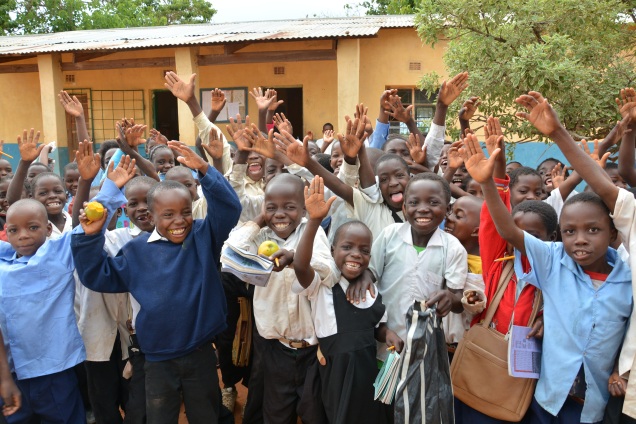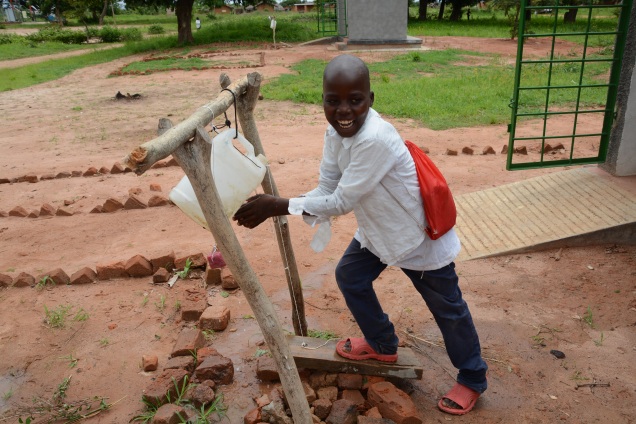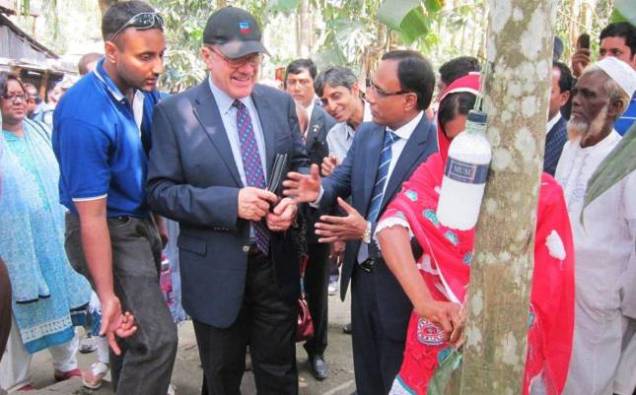Depuis octobre 2012, le projet WASHplus est mis en œuvre dans deux quartiers périurbains de Cotonou, la principale ville du Bénin. Après une étude de base quantitative et une analyse situationnelle qui ont permis de comprendre la problématique de l’hygiène dans ces quartiers, un programme pilote a été conçu en partenariat avec l’ONG ABMS/PSI. Ce programme pilote comprend un volet communication pour le changement de comportements et un volet de marketing social, et comporte trois axes à savoir le lavage des mains à l’eau et au savon, le traitement et la conservation de l’eau de boisson et enfin l’utilisation et l’entretien des latrines. Les mères et gardiennes d’enfants de 0 à 5 ans constituent la cible principale de ces actions de communication qui envisage de réduire les maladies diarrhéiques et le choléra.
L’analyse situationnelle réalisée au seuil du programme pilote a révélé que les connaissances des habitants des deux quartiers sur les mesures d’hygiène et d’assainissement sont en général faibles. Parmi ceux qui possèdent de bonnes connaissances, beaucoup n’en font pas toujours bon usage. Au manque d’information, s’ajoute l’ancrage des mauvaises habitudes en matière d’hygiène et d’assainissement dans le quotidien des populations, et le manque de disponibilité de produits WASH. Les populations gèrent leurs problèmes au quotidien et personne ne semble se préoccuper des répercussions négatives des actes actuels sur les populations elles-mêmes, les populations environnantes et les générations futures.
On peut donc dire que le défi auquel faisait face les acteurs du projet était très grand. Pour venir à bout de cette situation, des actions croisées de communication pour un changement de comportement étaient nécessaires, actions qui devaient tenir compte de la grande mobilité des populations de ces quartiers, de leurs activités, de leurs différentes occupations au cours d’une journée, bref des espaces qui occupent leurs vies au cours d’une journée.
Les principales caractéristiques des quartiers périurbains de Cotonou sont notamment la forte densité de la population, le dynamisme de la population, l’insertion de cette dernière dans des réseaux associatifs ou religieux qui se caractérise par la présence de nombreuses églises et groupements de femmes, la présence dans ces quartiers d’un nombre important d’écoles, la présence de radios locales très populaires auprès des populations. Ces éléments sont les constituants d’un système qui gouverne la vie dans les quartiers de Enagnon et Agbato.
Par définition, un système est un ensemble d’éléments interdépendants constituant une entité, une unité globale avec une limite. C’est un ensemble d’unités en interrelations mutuelles. Dans le cas d’espèce, le système est composé des ménages, des centres de santé, des écoles, des structures gouvernementales locales ou municipales, des structures religieuses comme églises, des groupements de femmes ou de représentants des quartiers.
Les ménages sont au centre de ce système car les cibles du programme passent une bonne partie de leur temps dans leurs maisons qui constituent donc de véritables espaces de communication et de démonstration des comportements promus par le programme WASHplus. Il n’est donc pas surprenant que les visites domiciliaires soient le principal mode d’action des relais communautaires dans ces deux quartiers. Chaque ménage reçoit deux visites hebdomadaires des relais qui touchent du doigt les dispositifs des lave-mains installés par les ménages ainsi que ceux de conservation de l’eau de boisson et la bonne pratique du lavage des mains et de l’utilisation des latrines.
Les formations sanitaires sont aussi un élément du système. En effet, le programme WASHplus vise les mères et gardiennes d’enfants de 0 à 5 ans et une bonne partie de ces dernières fréquentent ces centres pour les visites postnatales et pour les séances de vaccinations des bébés.
Les groupements sont aussi un élément du système car ils constituent des espaces de solidarité et partage d’expérience entre les membres. Ces groupements sont des associations non formelles qui réunissent essentiellement des femmes. Il s’agit donc de rassemblements de personnes pour un but donné, soit pour mener une activité commune, soit pour l’épargne et le crédit, soit des actions de solidarité. Ils sont le plus souvent constitués de femmes même si certains sont mixtes. Chaque groupement se réunit selon une périodicité donnée pour des activités données. C’est donc au cours de leur réunion que les relais passent les messages du projet WASHplus et échangent à bâton rompu avec les membres. L’intérêt ici est de communiquer avec plusieurs mères et gardiennes d’enfants à la fois.
Les structures religieuses sont un autre élément du système car elles constituent des espaces d’enseignement dont WASHplus s’est approprié pour faire passer le message sur l’hygiène et l’assainissement dans ces communautés. Nous sommes, en effet, en présence de populations très attachées à la pratique de la religion ce qui se remarque par la présence de nombreuses dénominations aussi bien catholiques, protestantes qu’évangéliques ainsi que musulmanes. Les responsables de certaines de ces structures ont donc accepté ouvrir leurs lieux de cultes à l’équipe de WASHplus afin de faciliter la communication avec les fidèles.
Les radios locales font aussi partie du système car elles sont très écoutées par les populations de Enagnon et Agbato. Elles sont donc de puissants outils de communication des messages sur le WASH. L’équipe du projet WASHplus a donc intégré CAPP FM et radio Tokpa, deux radios locales les plus suivies dans sa stratégie de communication avec la population. De nombreuses personnes ont témoigné avoir été touchées grâce aux spots et aux émissions interactives diffusés sur les ondes de ces radios.
Les écoles constituent un maillon important du système en place à Agbato et Enagnon. En effet, il est aujourd’hui démontré que travailler avec les écoles sur les questions WASH conduit non seulement au changement des comportements des élèves, mais exerce aussi une influence indirecte sur ceux de la communauté. Les enfants deviennent auprès de leurs parents des « relais » efficaces pour la duplication et la pérennisation dans la communauté des comportements souhaités ce qui confirme la pensée du poète Victor Hugo qui disait que « chaque enfant qu’on enseigne est un homme qu’on gagne ».
Comme on peut le voir, les différents éléments du système sont en interaction permanente. Les personnes visées par l’intervention à savoir les mères et gardiennes d’enfants se retrouvent en relation avec les différents éléments du système communautaire à des moments donnés de la journée. Ainsi, il n’y a pas de solution unique, exclusive. Les éléments du système fonctionnent de façon à réaliser ses objectifs à partir de différents points de départ et par différents moyens.
L’approche systémique donc est une façon innovante d’appréhender un système humain et de trouver la stratégie optimale pour l’aider à intégrer des changements. Il s’agit de répondre à un besoin de changement en s’appuyant sur les composants fondamentaux de la communauté afin de mobiliser les acteurs concernés dans une direction donnée de sorte à produire un résultat utile pour ces acteurs.
Grâce à cette approche le message du projet WASHplus passe par différents faisceaux pour atteindre les mères et gardiennes d’enfants parce qu’elles se trouvent à un moment donné de la journée ou de la semaine en contact ou impliquées dans l’un des éléments de ce système.
Armand A. AGUIDI
Coordonnateur WASHplus au Bénin
 By Julia Rosenbaum, Senior Behavior Change Advisor
By Julia Rosenbaum, Senior Behavior Change Advisor 

















